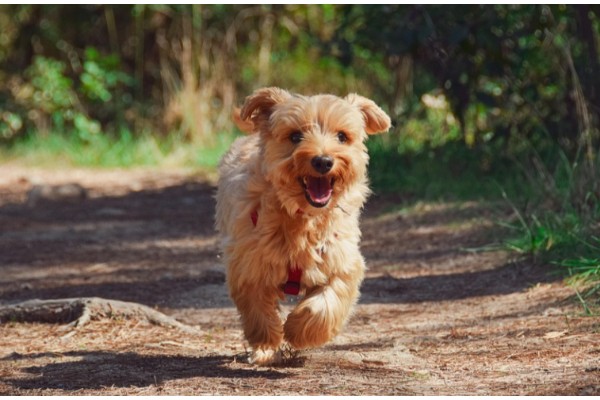Yes, Yorkies are hypoallergenic. Although no dog is truly 100% hypoallergenic, Yorkies are as close as you can get, making them the perfect pet if you suffer from allergies. They are small, shed little, don’t drool easily, and have human-like hair rather than fur. They are a great option for owners who have allergies for all of these reasons!
Table of Contents
Why Do Dogs Make Us Allergic?
No breed of dog is truly hypoallergenic, and dog allergies are a complicated problem. Dogs secrete proteins — specifically, can f1 and can f2 — that end up in their saliva, urine, and dander (dead skin), and certain people have a sensitivity to this usually harmless protein. Contrary to popular belief, this means that the dander, urine, and saliva of the dog are what people are allergic to rather than the fur. As opposed to the widely held belief that long-haired dogs are the problem, this means that both short-haired and long-haired breeds can cause an allergic reaction.
But things get tricky because different breeds have various levels of dander and different coats, which makes some allergy sufferers more sensitive to certain breeds than others. In fact, two dogs of the same breed may even emit varying amounts of dander, which makes the whole situation very confusing! This dander can linger in the air for a very long time and will unavoidably land on clothing, furniture, and carpet.
Sneezing, watery eyes, and a runny nose are common symptoms of dog allergies in people with sensitive immune systems because these symptoms are the body’s attempt to get rid of the allergen.
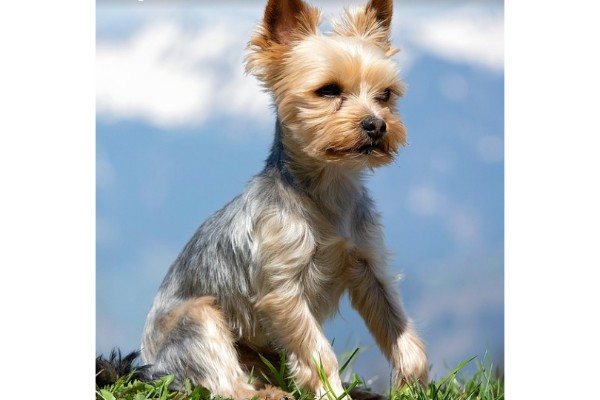
Are Yorkies Hypoallergenic?
Although it is not a given, Yorkies are much less likely to trigger an allergic reaction in people who already have allergies. Yorkies produce far less dander and, consequently, potential allergens than other dog breeds because they have fine, human-like hair rather than fur. Additionally, because they shed so little, the likelihood of allergens is even lower. In comparison to other dogs, Yorkies are smaller and have less hair. Additionally, because they lack an undercoat, they shed less and produce less dander.
Drool and saliva can also trigger allergic reactions, but this is not a cause for concern since the problem arises when these proteins dry out and become airborne. Instead of letting them lick you (despite how challenging that may be), try regularly washing your dog’s toys to prevent saliva buildup.)
Because of all these factors, many people believe Yorkies to be hypoallergenic, or at the very least, much less likely to trigger allergies than other breeds.
How To Find Out If You’re Allergic To Yorkies
Fortunately, the majority of people need not worry about a severe reaction to Yorkies.
However, since no dog breed is entirely hypoallergenic, you should test your allergies first before bringing home a new pet. You don’t want to adopt a dog with all your heart only to have to give it up a few days later when you realize you can’t share a home with it.
How can one determine if they are allergic to Yorkies? Go play with a puppy to solve the majority of the world’s issues.
In the dog park near you, look for a friend or neighbor who has a Yorkie and explain the situation to them. Visit the shelter, breeder, or pet shop where you intend to buy your puppy, or even better—go there.
The majority of people are going to be more than happy to let you play with their dog, especially if it’s the same dog you might end up adopting.
You should be able to tell fairly quickly if you’re going to be able to live with a Yorkie if you can spend an hour or two getting up close and personal with one. Simply keep an eye out for typical allergic reaction symptoms.
Common signs that you’re allergic to your dog
- Sneezing and a runny or stuffy nose
- Nasal congestion, including facial pain or earache
- Postnasal drip and an itchy throat
- Wheezing, coughing, or trouble breathing
- Rashes, hives, or eczema where skin comes in contact with dog saliva
- Foggy or watery eyes
- Nausea or digestive problems
We don’t advise getting a Yorkie as a pet if you have a blatant and significant allergic reaction to one.
You might convince yourself that you can ignore your allergies because you love the new pup so much. Yorkies, however, can live for 12 to 15 years, and during that time, your home needs to be a cozy place for the two of you.
The last thing you want to happen is to develop a bond with the dog only to later learn that your allergies have gotten worse and you have to give up the pet.
The majority of people shouldn’t have to worry, though, as Yorkies rank highly on the hypoallergenic scale.
How To Minimize Allergic Reactions To Yorkies
Since Yorkies are not truly hypoallergenic, allergy sufferers may still experience reactions even though they are much less likely to do so when sharing a home with one. For this reason, we strongly advise getting to know Yorkies before bringing one home. Once you do decide to bring home a puppy, there are ways that you can minimize any reactions that you may have:
Training. Yorkies are intelligent, eager to please, and typically easy to train dogs. Early training will help them develop the proper habits that will lessen their symptoms. This entails establishing consistent grooming and brushing routines for them as well as setting clear ground rules for behavior inside your homes, such as staying off your bed and sofa.
Regular grooming. You can keep your Yorkie’s coat nearly dander-free by regularly brushing and cleaning it. Bathe and brush your Yorkie frequently, and keep their coat relatively short and trim to further reduce dander buildup.
Hygiene. If your symptoms persist, you might want to start washing your hands after petting your Yorkie and refrain from touching your hands or face in general.
About Yorkies:
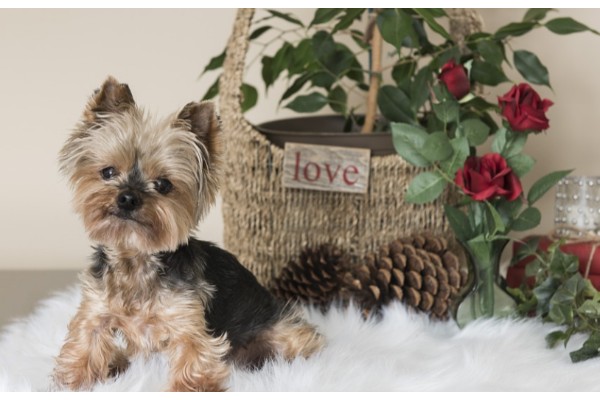
Basics
Other Names
Yorkies is another name for Yorkshire Terriers.
Yorkshire Terrier Mixes
Because of their propensity to bark, Yorkshire Terrier mixes are frequently available from shelters and rescues. Although Yorkshire Terrier mixes may have traits in common with many other breeds, they are likely to have at least some physical and behavioral traits in common with Yorkshire Terriers. Although Yorkshire terriers are among the best dogs for allergy sufferers, it’s possible that a mix of the two breeds won’t be as hypoallergenic. Additionally, since the majority of shelters do not perform DNA testing on their mixed-breed dogs, breed heritage is typically determined using the dog’s characteristics and any information provided at the time of surrender.
Locate a shelter that conducts genetic testing on mixed breed animals if you have your heart set on a Yorkshire Terrier mix, or alert neighborhood shelters to your interest in AKC-registered Yorkshire Terrier surrenders. Remember that each dog’s personality can vary from the breed average based on their particular genetics, experiences, training, and socialization, even if there is proof of their Yorkie ancestry.
Maltese, Poodle, Chihuahua, Pomeranian, Shih Tzu, Schnauzer, and Jack Russell Terrier are frequently used as breeding stock for Yorkshire terrier hybrids.
Coat
The Yorkshire Terrier’s long, silky coat resembles human hair more than animal fur. The long, straight hair on a Yorkie’s body needs to be trimmed for neatness and to stop tripping. The Yorkie’s hair must either be parted down the middle and tied with two bows for competition purposes, or it must be tied in one bow at the top of the head. Black and tan, black and gold, blue and gold, and blue and tan are the coat colors.
Height
Average Height: 7-8 inches
Weight
Average Weight: 7 pounds
Breed Standard & History
Yorkies are small dogs with short backs. They walk with their heads held high, exuding intelligence and self-assurance. Their V-shaped ears stand up, they have a small muzzle, and their eyes are dark.
As a result of the cross between rough-coated Black-and-Tan English Terriers and Paisley and Clydesdale Terriers, Yorkshire Terriers are the offspring of Waterside Terriers. They were brought to Yorkshire by weavers moving south from Scotland and used as “ratters” in textile mills. The breed first appeared in benched dog shows in England in 1861 under the breed name “Scotch terrier breed with broken hair.” Their name was changed to “Yorkshire Terrier” after the reporter They ought to bear the name of the locale where the distinctive traits of the breed were developed, according to Angus Sutherland.
AKC Breed Category
Toy Group
Food
Two to three small meals should be given to Yorkies each day. It is best to discuss the ideal amount of food for your Yorkie’s age and weight with your veterinarian because of their diminutive size and propensity for low blood sugar.
Alone Time
Yorkies struggle with separation anxiety and do not enjoy being left alone for long periods of time. They prefer to go everywhere with you because they are the classic “purse dogs.” Yorkshire terriers frequently follow their owners around the house.
General Temperament
Little dogs with a spring in their step, Yorkies are courageous and bouncy. Although they also enjoy lots of lap time on the couch, they are constantly eager and willing to play.
Family Life
What about Yorkshire Terriers and children? Yorkshire Terriers can get along well with kids, but both the dog and the kids need to be properly trained. Yorkies should be socialized early on to feel at ease around kids. Yorkies are small in stature but have fierce personalities, so children should be taught to be gentle around them. If a child is too rough with the dog or doesn’t notice when the dog needs a break, the Yorkshire Terrier will defend itself.
(Note: Every dog has a different personality and different life experiences that influence his temperament. Children playing with their four-legged friends should generally be under adult supervision.)
Are Yorkshire Terriers compatible with other animals? When raised with other pets, Yorkies become tolerant and even friendly toward them. At the dog park, Yorkies are typically friendly, but if they feel threatened, they will turn aggressive toward any size dog.
Protective
Yorkies are known for their fierce territorial defense of their families.
Do Yorkshire Terriers Make Effective Guard Dogs? When they notice the first sign of visitors to your home, Yorkies will bark repeatedly and loudly to let you know.
Energy Levels
Yorkshire Terriers have a medium level of energy. For them to stay healthy, they need to go on a few walks and play for a while each day.
Specific Concerns are
- prone to excessive barking that is too loud.
- difficult to house train.
- independent-minded and tenacious.
- Can be picky eaters.
- Detest being by yourself.
Requirements
Indoor
Yorkshire Terriers make excellent indoor dogs. Because of their distinctive coats, they don’t shed fur all over the house and are typically amicable and fun-loving. They make great apartment dogs and wonderful pets for older people due to their size and moderate exercise needs.
Outdoor
Yorkies enjoy playing outside, but they are not yarded dogs that should be left alone for extended periods of time. If you do have a yard for your Yorkie, make sure to double-check it for escape routes because they are small and can easily dig under fences.
Exercise
Your Yorkie will stay in top shape with daily short walks on their preferred leash and collar and tossing sessions in the living room.
Endurance
Yorkies can keep up with you during medium-length walks and play sessions despite being only moderately active dogs. They’ll also indicate when they’ve had enough by stopping, at which point you can put them in your purse and carry them the rest of the way.
Activity distance rating
- Running Miles: For a Yorkie, a few sprints back and forth across the yard are sufficient.
- Hiking Miles: A Yorkie should stay at home when you go hiking.
Trainability
Basics
It can be challenging to housebreak Yorkshire Terriers. Puppy pads are important, as well as patience and consistency.
Although Yorkies are amenable to obedience training, their obstinate independence can make things take longer. The best results come from early, persistent training that is rewarded with lots of dog treats.
Advanced Training
Yorkies are athletic and energetic, making them perfect for agility training whether it’s for a show or just for a backyard game.
Sporting Dog Training
Yorkshire Terriers are capable of being trained for non-competitive AKC Earthdog tests, which help them hone their abilities for hunting rodents in tunnels below ground.
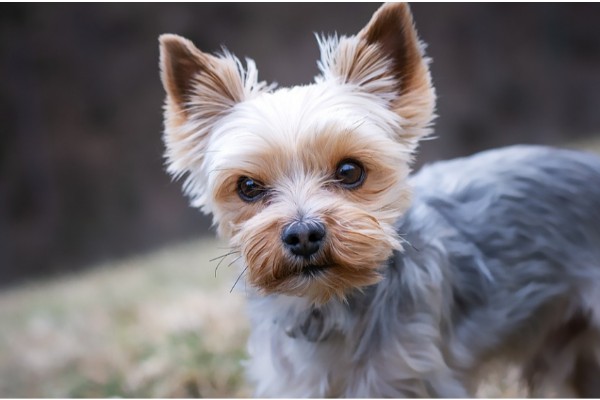
Do Yorkies Shed?
Even those with allergies who love dogs can make a great choice in Yorkies. While Yorkies are technically hypoallergenic, unlike other dog breeds, they do shed, even if it’s not as often.
Hair is composed of different-sized strands. The Yorkshire Terrier’s coat is distinctive because it is made of long, silky hair rather than fur. In addition, Yorkie dog hair resembles human hair rather than dog fur, so they shed less.
Yorkies also have just one coat.
Typically, Yorkies shed once or twice a year as seasons change. Because they lose older hair strands during these times, their hair tends to be thinner as a result.
The natural shedding cycle is a perk of having a Yorkshire Terrier because of the way its hair typically falls back into its coat.
When Yorkie Shedding Is An Issue
Minor shedding is nothing to worry about, but it can be concerning when it becomes excessive.
Important traits to look for include:
- Hair loss all over
- Lack of appetite, weight loss
- Bald patches, scabs
- Bumps or lumps
Reasons For Shedding
There are many reasons for excessive shedding, but if your dog experiences more hair loss than expected, there could be an underlying cause.
Causes for significant shedding include:
- Lack of grooming
- Poor nutrition
- Stress
- Parasites
- Allergies
- Sickness
- Pregnancy
Grooming
Grooming is essential for your The Yorkie encourages glands, aids in natural oils, and removes dead hair. It minimizes the possibility of increased shedding and is good for their health and growth stimulation. It is best to keep it’s hair short.
If grooming is a potential hazard, hiring a professional to care for your dog thoroughly is essential. While reducing allergens for both you and your dog, it’s a win-win situation.
Poor Nutrition
A lack of essential nutrients your Hair loss can also be brought on by Yorkie’s needs. Especially with the help of vitamins B and E, a balanced diet can combat this. The first signs of malnutrition are patches of hair loss, additional weight loss, and muscle weakness.
Stress
Hair loss can also be a sign of stress. Changes in routine or environment can raise cortisone levels and affect hair follicles. Yorkies can also get emotional, especially when they experience separation anxiety.
A condition called neurodermatitis can also arise due to stress and anxiety. Dogs repeatedly lick their coats to the extreme when this occurs, causing patchy hair loss.
Parasites
Hair loss in a single area, even without other symptoms, could indicate potential parasite invaders. Pyoderma, an infection brought on by bacteria, is an illustration of a parasite. Ringworm is another option; both conditions can result in infections of the skin and hair loss.
Yorkies are susceptible to fungal infections and ticks, leading to more shedding and a vicious cycle.
Allergies
Like you, Yorkies can have allergies, which can affect shedding. In addition, atopic dermatitis can affect these little guys due to pollen, dust, mold, and bacteria. The condition manifests as biting, licking, and skin inflammation, which eventually results in hair loss.
Sickness
Sometimes hair loss is a symptom of an illness, such as alopecia. Alopecia is common with Without any other symptoms, hair loss in Yorkies is possible. The good news is that hair can grow back.
Hypothyroidism can occur and cause poor health and can cause hair breakage. Lethargy, weight changes, a faster metabolism, thickening of the skin, and increased metabolism are additional symptoms.
Cushing’s disease is another common ailment. The disease is typical with hair loss since it’s a hormone disorder.
Pregnancy
Hair loss in pregnancy is common for dogs due to hormone fluctuations. Fortunately, hair will regrow after delivery. Fatigue and weight gain are possible additional symptoms.
Frequent vet checkups are essential, especially if you are concerned or notice anything unusual. Symptoms, even shedding, can indicate further health issues.
Your Yorkie’s coat will benefit from maintaining overall good health.
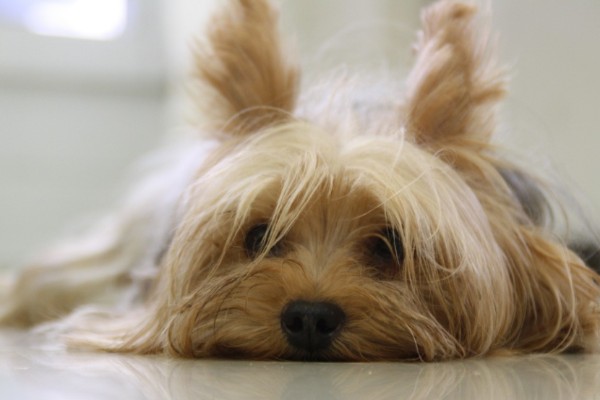
How To Groom Yorkies?
There are vital tips to remember when grooming your Yorkie:
- periodic haircut trims.
- Regular brushing of your Yorkie with the right equipment is essential for good grooming. Their coats are prone to becoming matted or tangled, so this will keep them looking tidy.
- Brush before bathing.
- Remember to give your Yorkie a regular bath, usually once a week if it spends a lot of time outside. Alternatively, once every few weeks will do.
- Ear infections and redness should be watched for.
- Monthly nail trims.
- brushing your teeth every day, if you can.
It’s important to note that bathing too much can do more harm than good and lead to more hair loss. Itchy, dry skin is also a concern. In addition, the coat will weaken due to excessive rubbing and can cause natural oils to strip.
On the contrary, if you don’t bathe your Yorkie enough, they can smell like sweat, dead hair, and dirt continues to build. Therefore, proper grooming is essential before an accumulation occurs.
Yorkie Tips For Your Home
While it’s essential to take proper care of your dog, it’s just as important to take care of your home. A home environment free of allergies is possible.
It’s a great idea to get an air purifier, especially to run at night while sleeping. Allergies can affect your Yorkie’s hair because they are present everywhere, both indoors and outdoors. Even if you may not be allergic to your dog, you could be allergic to particles they attract on their sleek coat.
Air purifiers promote airflow in your home and will soothe potential allergens. Dander, however, can also ingest carpets and clothing. Therefore, dusting, vacuuming, and moping are recommended for deep cleaning at least once a week.
Other valuable tips include:
- removing and washing any clothing made of hair.
- Protect against dust by covering surfaces.
- Maintain specific areas for your Yorkie.
- Have lint brushes on hand.
- Get a vacuum with a HEPA filter.
- Use dander-reducing products, such as organic concoctions like apple cider vinegar or lime juice.
Whether you have indoor or outdoor allergies or are concerned you perhaps could be allergic to your Yorkie, there are ways to combat allergies as best as you can.
